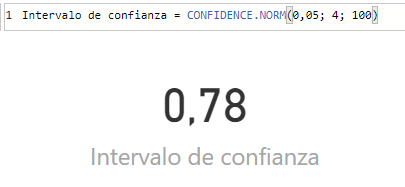The CONFIDENCE.NORM function returns the confidence interval for the mean value of a sample from a population, using a normal distribution, given an alpha confidence value.
The function returns a real number x, with the associated confidence interval being given by the range [mean value - x, mean value + x] . This means that, for any sample in the population, the probability of obtaining a sample mean further than x from the mean of the original sample will be the alpha value.
CONFIDENCE.NORM(
alpha,
standard_dev,
size
)
- alpha: Value used to calculate the confidence level. This is calculated as 100*(1-alpha) or, in other words, an alpha value of 0.05 represents a 95% confidence level.
- standard_dev: Standard deviation of the data.
- size: Population size.
The CONFIDENCE.NORM function returns a real number.
If any of the arguments are not numeric, the function returns the #VALUE! error.
If alpha is less than or equal to 0, or greater than or equal to 1, the function returns the #NUM! error.
If the indicated standard deviation is less than or equal to zero, or the sample size is less than 1, the function also returns the #NUM! error.
If the sample size is not a whole number, it is automatically rounded.
Given a set of 100 values whose standard deviation is 4, the 95% confidence interval is given by the following measure:
Intervalo de confianza = CONFIDENCE.NORM(0,05, 4, 100)
